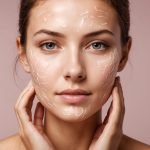Exploring the Most Recent Therapies for Aging-Related Itching in Elderly Skin
As we age, our skin undergoes significant changes that can lead to a variety of issues, one of the most bothersome being itching, or pruritus. This condition can severely impact the quality of life for elderly individuals, causing discomfort, sleep disturbances, and even emotional distress. In this article, we will delve into the latest therapies and treatments designed to alleviate aging-related itching, providing a comprehensive guide for both patients and caregivers.
Understanding Aging-Related Itching
Itching in elderly skin is often a complex issue with multiple underlying causes. Here are some key factors to consider:
Topic to read : How Often Should Seniors Over 70 with Dental Implants Schedule Dental Visits? A Comprehensive Guide
Dry Skin
As we age, our skin’s natural barrier function weakens, leading to dryness. This dryness can cause itching, redness, and even cracking of the skin. Moisturizing regularly is crucial to maintain skin hydration and prevent these issues.
Skin Conditions
Conditions such as atopic dermatitis, eczema, and psoriasis are common causes of itchy skin in older adults. These conditions can be exacerbated by the natural aging process, which reduces the skin’s ability to retain moisture and protect itself from environmental irritants.
Also to discover : Exploring the Effects of Brexit on Healthcare Access for British Seniors Residing Overseas
Internal Diseases
Sometimes, itchy skin can be a symptom of an underlying internal disease, such as liver or kidney disease, or even certain malignancies. It is essential to consult a healthcare provider to rule out any serious underlying conditions.
Latest Therapies for Itchy Skin
Several recent therapies have shown promising results in treating itchy skin in elderly patients.
Topical Treatments
Topical treatments are often the first line of defense against itchy skin. Here are some of the latest and most effective options:
- Fragrance-Free Moisturizers: Using a fragrance-free, chemical-free moisturizer can help lock in moisture and reduce itching. Applying moisturizer immediately after bathing or showering is particularly effective.
- Corticosteroid Creams: For more severe cases of itchy skin, corticosteroid creams can be prescribed. These creams reduce inflammation and itching but should be used under the guidance of a healthcare provider due to potential side effects.
- Calcineurin Inhibitors: These creams, such as pimecrolimus and tacrolimus, are effective in treating atopic dermatitis and other inflammatory skin conditions. They work by reducing the immune system’s response to allergens and irritants.
Systemic Treatments
For cases where topical treatments are insufficient, systemic treatments may be necessary.
- Dupixent (Dupilumab): This is a fully human monoclonal antibody that inhibits the signaling of the IL-4 and IL-13 pathways, key drivers of type 2 inflammation. Dupixent has been shown to significantly reduce itch and hive activity in patients with chronic spontaneous urticaria and atopic dermatitis.
- OPZELURA (Ruxolitinib): This topical JAK inhibitor has been proven to provide meaningful itch relief in patients with mild to moderate atopic dermatitis. Clinical trials have shown that over half of the patients experienced significant itch relief within 8 weeks.
Practical Tips for Managing Itchy Skin
Here are some practical tips that can help elderly patients manage itchy skin:
Skin Care Routine
- Use Gentle Cleansers: Always use gentle, fragrance-free cleansers to avoid stripping the skin of its natural oils.
- Warm Water: Use warm water instead of hot water to clean the face and body.
- Short Showers: Keep showers and baths short to prevent excessive moisture loss.
Environmental Adjustments
- Humidifiers: Using a humidifier can help maintain the moisture level in the air, reducing dry skin.
- Avoid Irritants: Avoid items or situations that can cause itching, such as certain soaps, wool, or cosmetics.
- Stress Reduction: High stress levels can exacerbate itchy skin. Engaging in stress-reducing activities like meditation or yoga can be beneficial.
Regular Check-Ups
Regular skin exams are crucial for elderly patients, especially those at high risk for skin cancer or other skin conditions. Early detection and treatment can significantly improve outcomes.
Comparative Analysis of Treatments
Here is a comparative table of some of the latest treatments for itchy skin in elderly patients:
| Treatment | Mechanism of Action | Common Side Effects | Efficacy Rate |
|---|---|---|---|
| Dupixent | Inhibits IL-4 and IL-13 pathways | Injection site reactions, accidental overdose | 41% achieved well-controlled disease |
| COVID-19 infection | status | ||
| OPZELURA | JAK inhibitor | Common cold, diarrhea, bronchitis | Over 50% experienced meaningful itch |
| Ear infection, hives | relief within 8 weeks | ||
| Corticosteroid | Reduces inflammation | Skin thinning, rosacea | Effective in reducing inflammation |
| Creams | and itching | ||
| Calcineurin | Reduces immune response to allergens | Burning sensation, itching | Effective in treating atopic |
| Inhibitors | dermatitis |
Expert Insights and Patient Experiences
“Chronic spontaneous urticaria is an inflammatory skin condition that affects patients with unpredictable episodes of intense itching and hives, often severely impacting their daily lives,” said a dermatologist involved in the Dupixent trials. “The latest therapies offer significant hope for these patients, providing relief from symptoms that were previously difficult to manage”.
A patient who participated in the OPZELURA trials shared, “I had been suffering from itchy skin for years, and nothing seemed to work. But after using OPZELURA, I noticed a significant reduction in itching within just a few weeks. It’s been a game-changer for my quality of life.”
Aging-related itching is a complex issue that requires a multifaceted approach. By understanding the underlying causes and utilizing the latest therapies, elderly patients can find significant relief from itchy skin. It is crucial to work closely with healthcare providers to develop a personalized treatment plan that includes both topical and systemic treatments, as well as lifestyle adjustments.
For scholars and researchers, staying updated with the latest studies on PubMed and Google Scholar can provide valuable insights into new treatments and their efficacy. For instance, a recent study on the efficacy of Dupixent in treating chronic spontaneous urticaria highlights the importance of targeted therapies in managing age-related skin conditions.
In conclusion, managing itchy skin in elderly patients is not just about treating the symptoms but also about addressing the underlying causes and maintaining overall skin health. With the right combination of treatments and lifestyle changes, it is possible to significantly improve the quality of life for older patients suffering from this common yet bothersome condition.











